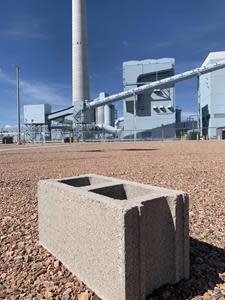UCLA CarbonBuilt Team Wins NRG COSIA Carbon XPRIZE
Technology reduces carbon emissions by more than 50% while increasing profitability for concrete manufacturers
CarbonBuilt Low Carbon Concrete


CarbonBuilt's technology lowers the carbon footprint of concrete by more than 50 percent by injecting CO2 emissions from industrial sources.
LOS ANGELES, April 19, 2021 (GLOBE NEWSWIRE) -- The UCLA CarbonBuilt team has been named one of two winners in the $20 million NRG COSIA Carbon XPRIZE for its technology that reduces the carbon footprint of concrete production by more than 50 percent while increasing profitability for concrete manufacturers. The team was recognized for having the best demonstration as well as for its product, technology, and market advantages.
Gaurav Sant, a professor of civil and environmental engineering at the UCLA Samueli School of Engineering, led the team of multidisciplinary faculty, project scientists, graduate students and industry experts. He also holds a faculty appointment in the Department of Materials Science and Engineering and is Director of the Institute for Carbon Management at UCLA. In 2020, Sant founded CarbonBuilt to commercialize this technology, now called ReversaTM.
CarbonBuilt’s Reversa platform includes innovations to concrete’s mixture design and its curing process. The formulation includes hydrated lime (a commodity chemical used in a wide range of applications; also known as portlandite or calcium hydroxide), which enables a significant decrease in the need for ordinary Portland cement (OPC) as well as increased and more flexible use of low-cost waste materials like fly ash or slag. During the curing process, CO2 is directly injected from flue gas streams (such as those at power plants or cement factories) into the mixture where it is chemically transformed and permanently stored in the concrete. Together, these innovations enable concrete manufacturers to both reduce the carbon footprint of their products by more than 50 percent while also increasing profitability.
A concrete block produced with Reversa is able to permanently store about ¾ of a pound of CO2. Industry analysts project that 1 trillion concrete blocks will be produced annually by 2027. At that scale, Reversa could store roughly 350 million tons of CO2 each year which equates to nearly 1 percent of all global emissions or the total annual emissions of the United Kingdom.
“I am absolutely thrilled that CarbonBuilt has won the NRG COSIA Carbon XPRIZE,” said Sant. “Having grown up on job sites, I have always been fascinated with the role that construction has played in solving societal challenges. To have spent the last decade finding a solution to mitigate the carbon footprint of concrete construction with a phenomenal team, and to have won the XPRIZE doing so is an ultimate dream come true.”
The first field demonstration of the technology took place at the Wyoming Infrastructure Authority’s Integrated Test Center, where the team successfully sequestered waste CO2 from a coal-fired power plant in more than 10,000 concrete blocks. Two independent labs confirmed that the blocks met standard industry specifications. A second demonstration using CO2 from both coal- and natural gas-fired turbines at the National Carbon Capture Center in Alabama, was completed in early April with the team overcoming the challenges of Covid-19, ice storms and tornadoes.
Both demonstrations highlight Reversa’s ability to consume a wide range of dilute CO2 streams, unlocking the potential for partnerships across a wide range of industries, including with many of the distributed direct air capture technologies that are currently under development.
“With incredible innovation and persistence, Gaurav and his team have developed technology that has the potential to reduce emissions at a gigaton scale,” said CarbonBuilt CEO Rahul Shendure. “We thank the NRG COSIA Carbon XPRIZE team not only for the award but also for setting high standards which resulted in a commercial-ready process. We look forward to delivering on our mission to decarbonize the concrete industry.”
The $20 million NRG COSIA Carbon XPRIZE was a 6-year global competition, launched in September 2015, to address CO2 emissions from fossil fuels. It challenged innovators around the world to develop breakthrough technologies that convert the most CO2 into products with the highest net value. To be competitive, teams had to minimize their use of energy, water, land, and overall CO2 footprint. XPRIZE received 47 submissions from 7 countries, 10 of which made it to the final round in 2020.
About CarbonBuilt
CarbonBuilt’s mission is to enable concrete manufacturing to drive large-scale greenhouse gas reductions through the cost-effective utilization of CO2 and other industrial wastes. Its ReversaTM process injects CO2 emissions taken directly from industrial sources into proprietary low-carbon concrete formulations. This revolutionary approach reduces overall CO2 emissions by more than 50 percent while creating end products that meet industry specifications and increase profitability for concrete producers. More information is available at www.carbonbuilt.com.
Media Contact
John Williams, Scoville PR for CarbonBuilt
jwilliams@scovillepr.com; 206-660-5503
A photo accompanying this announcement is available at https://www.globenewswire.com/NewsRoom/AttachmentNg/5faa6d8d-09fc-4adc-a147-69c7fd9e78f2
